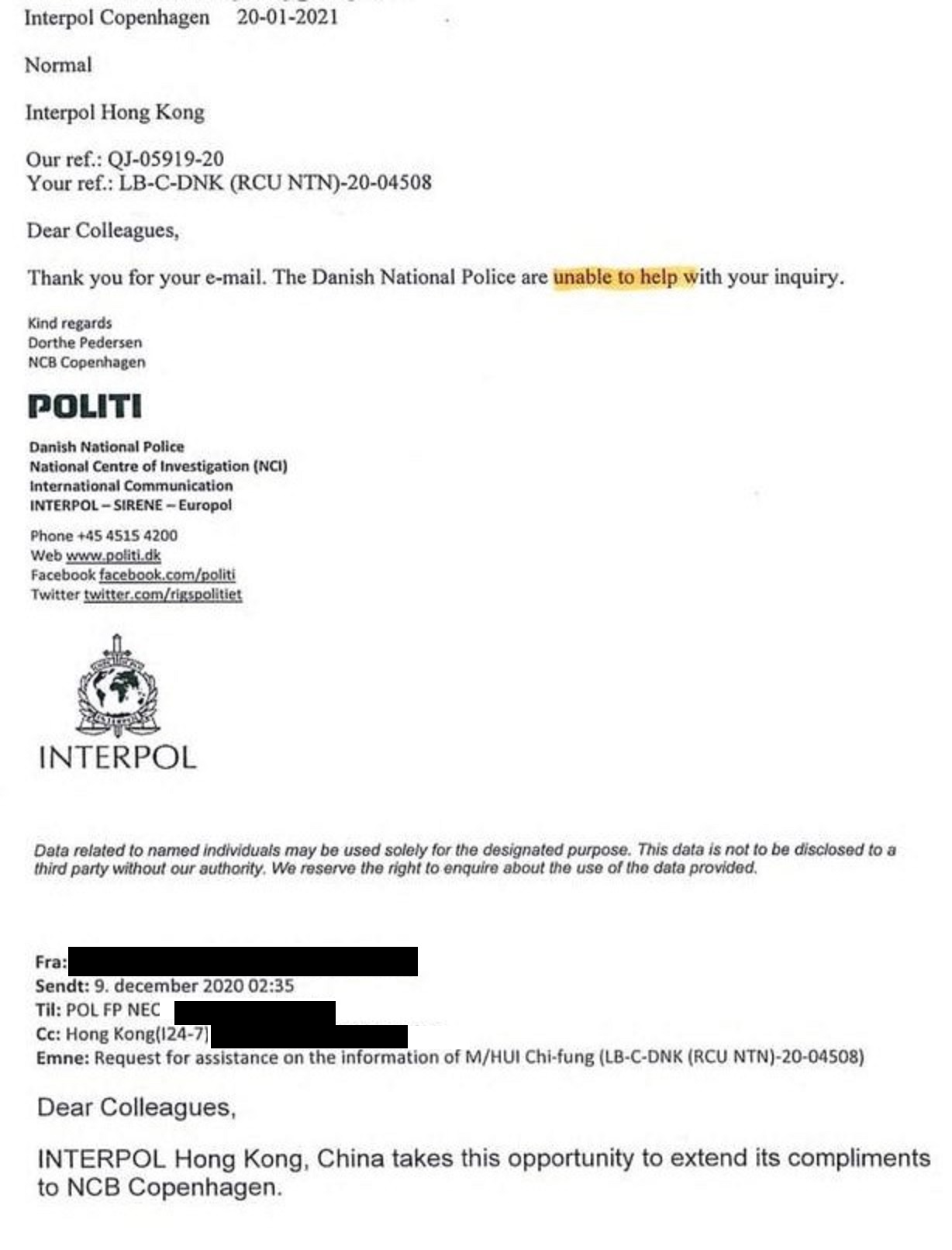Hong Kong police sought Danish help in investigating Danish MPs
Note: This development, and supporting documents, was revealed by the Danish newspaper Politiken today, October 26.
On December 9, 2020, Hong Kong and China together, using Interpol channels, sent a request to the Danish police, based on the existing mutual legal assistance treaty (MLAT), asking for assistance in investigating whether two Danish elected members of parliament (Uffe Elbæk and Katarina Ammitzbøll) had helped former Hong Kong politician and pro-democracy leader Ted Hui flee Hong Kong.
Ted Hui is one of roughly 30 known alleged “fugitives” from Hong Kong charged with crimes under Hong Kong’s new National Security law. Safeguard Defenders have identified roughly 20 of the claimed 30 “fugitives” (to be released later), all of whom are known key figures in the pro-democracy camp and/or anti-extradition movement.

Credit:Politiken
It was first today (October 26), almost ten months later, that China and Hong Kong’s attempt to secure Danish cooperation in their investigation was made known via reporting in Denmark's Politiken. The request was denied on January 20, which was also 11 days after the South China Morning Post released a report with Hong Kong’s Security Bureau saying ““In light of the circumstances of each case, the police will track down the whereabouts of the fugitive offenders through various means in accordance with the law and pursue them” and that it applied to “…any person, regardless of his nationality”. The month before, in December 2020, Beijing itself, via its Foreign Ministry Spokesperson Hua Chunying, accused Danish politicians of harboring criminals and meddling in China’s domestic affairs by supporting Hui.
Such requests can be denied if it goes against “the rule of law”, an option exercised by Denmark in this case. Interestingly, the request was sent by both China and Hong Kong together.

Credit:Politiken
Recently the Chinese and Hong Kong governments have used increasingly hyperbole language to claim that they will not only pursue such “fugitives” but have three tools to do so. The first one, extradition, is well known. Both the Czech Republic and Portugal have ignored calls by the EU to suspend extradition treaties with Hong Kong, even though most other European countries have done so.
This, however, Hong Kong authorities say, should not make any “fugitive” feel safe, as Hong Kong maintains mutual legal assistance treaties (MLATs) with a great many countries, and so do China, and will seek to utilize those to get assistance in investigating, and ultimately, securing the return of, such fugitives. Regina Ip, the former Security Secretary, went further and also mentioned the ability of Hong Kong to utilize Interpol to seek and secure their return.
Despite protections within MLATs and within Interpol to protect against misuse, such misuse does occur, as the recent case of Idris Hasan shows, who Interpol is responsible for having detained in Morocco, and who is now facing possible extradition to China, despite it showing, upon closer inspection, that the Interpol Red Notice was political in nature – after which Interpol canceled it. Idris next court date for fighting his extradition is tomorrow, October 27.
Words out of both Hong Kong and Chinese governments likewise seem intent on using MLATs and Interpol, in addition to extradition, to seek these, often young, pro-democracy organizers from Hong Kong returned to face “justice”. In fact, the current Security Secretary, John Lee Ka-chiu, recently stated that “absconders” will be “pursued for life”. He went further to say that foreign governments may block requests for assistance, for example, via MLATs, now, but that circumstances changes. The implied threat was clear.
“The Hong Kong government, police and courts can work together to take various measures to recapture absconders and prevent more incidents like this from happening, Kennedy Wong Ying-ho, solicitor of the Supreme Court of Hong Kong, told the Global Times on Thursday.”
And that:
“Hong Kong is a member of Interpol, and member countries or regions have the obligation to provide mutual legal assistance to each other in criminal matters,” Wong said, “The Hong Kong police can make an offer of arrest to Interpol. If the absconder is on bail, then the court can also issue an international warrant.”
Hong Kong pro-democracy organizers, Chinese human rights defenders, and NGOs have called on European governments to suspend extradition treaties with China, and for the Czech Republic and Portugal to follow the EU's call and suspend their extradition agreements with Hong Kong.